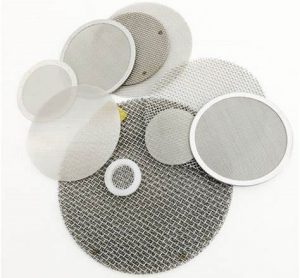To select the best extruder screen for your processes, consider the following factors:
Welding: Proper welding is crucial to ensure the screens remain intact and do not bend, stretch, or break during operation. Any deformation in the screen can alter the opening sizes and impact the filtration results. Ensuring high-quality welding will extend the lifespan of the screens and minimize the need for frequent replacements.
Wire Mesh Screen: The wire mesh in the screen should be able to withstand the material being filtered. Consider factors such as the strength and durability of the mesh material in relation to the process conditions. Additionally, the opening size and weave type of the mesh are essential for achieving the desired filtration quality. Micron ratings and mesh counts can vary widely based on your specific filtration requirements.
Square mesh is commonly used due to its good flow capability, but for finer filtration, filter weaves like Dutch Twill and others can be employed.
By taking these factors into account and understanding your desired filtration outcome, you can make an informed decision when selecting an extruder screen that suits your specific application.
